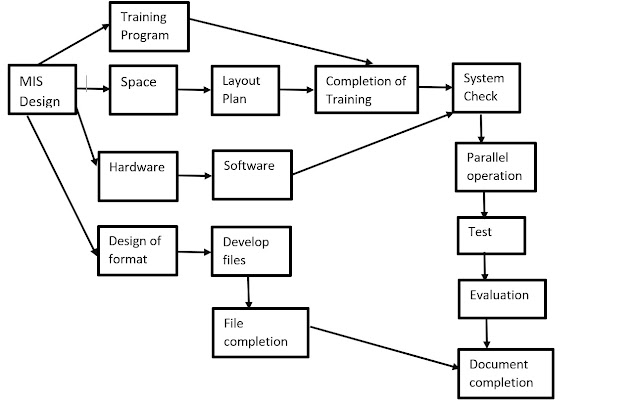Implementation, Applications and Benefits of Management Information System (MIS)
Implementation Of MIS :
Before installing a new MIS in any organization, it is desirable to know whether there is already an old MIS in operation. If so, then the old system is allowed to operate in parallel, till the new system is fully operational. The implementation plan involves the following steps:
- Preparing organizational Plans.
- Planning of work flow.
- Training of personnel.
- Developing of software.
- Acquiring computer hardware.
- Designing the format for data collection.
- Construction of data files.
- Operation of old and new systems in parallel.
- Phasing out the old and inducting the new system.
- Evaluation, maintenance and control of the new system.
Applications of Management Information System :
With computers being as omnipresent as they are today, there’s hardly any organization that does not rely on the IT systems.
- Strategic Support : Computers cannot create business strategies by themselves. They can assist management in understanding the affects of their strategies. and help enable effective decision-making. MIS provides a valuable function; they can collate into coherent reports unmanageable volumes of data that would otherwise be broadly useless to decision makers. By studying these reports decision-makers can identify patterns and trends that would have remained unseen if the raw were consulted manually. MIS can be used to transform data into information useful for decision making. Computers can provide financial statements and performance reports to assist in the planning monitoring and implementation of strategy.
- Management by Objectives : MIS is extremely useful in generating statistical reports and data analysis they can also be of use as a Management by Objectives (MBO) tools. MBO is a management process by which managers and subordinates agree upon a series of objectives for the subordinates to attempt to achieve within a set time frame. Objectives are set using the SMART ratio, that is, objectives should be Specific Measurable, Agreed, Realistic and time-Specific.
- Data Processing : Not only do MIS allow for the collation of vast amounts of business data, but they also provide a valuable time saving benefit to the workforce. Where in the past business information had to be manually processed for filing and analysis it can now be entered quickly and easily onto a computers by a data analysis it can now be entered quickly and easily onto a computers by a data processes, allowing for faster decision making and quicker reflexes for the enterprise as a whole.
Benefits Of Management Information System:
- Aid in decision Making : MIS cam generate synthesized and processed information from computerized/automated and certain manual systems. Information distribution to all levels of corporate managers, professionals and executive become quite seamless with streamlined MIS. Managers are able to make quick, timely and informed decisions.
- Better Planning and Control : MIS is designed and managed in such a way that it aggregates information, monitors the company’s activities and operations and enhances communications and collaborations among employees. This ensures better planning for all activities and better ways to measures performance, manage resources and facilitate compliance with industry and government regulations. Control helps in forecasting, preparing accurate budgets and providing the tools and vital information to employees, top management and business partners.
- Core Competencies : MIS provide the tools necessary to gain a better understanding of the market as well as a better understanding of the enterprise itself. Every market leading enterprise will have at least one core competency -that is, “a function they perform better than their competition”.
- Quick Reflexes : As a corollary to improved supply chain management comes an improved ability to react to change in the market. Better MIS enables an enterprise to react more quickly to their environment, enabling them to push out ahead of the competition and produce a better service and a large piece of the pie.
- Enhance supply chain Management : Improved reporting of business processes leads inevitably to a more streamlined production process. With better information on the production process, comes the ability to improve the management of the supply chain, including everything form the sourcing of materials to the manufacturing and distribution of the finished product.
Management As a control system. Management Information System MIS


